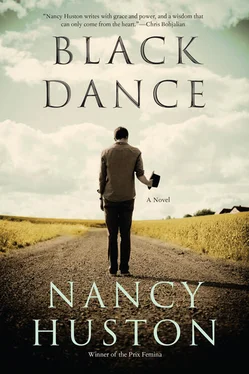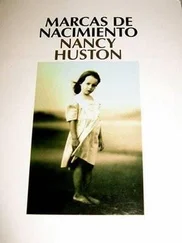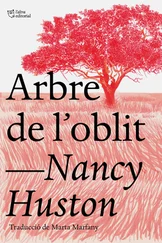Receding from the vortex of the event, our camera turns and finds itself nose to nose with. . another camera. Shooting the roda in black and white is a film crew from New York, Milo among them. . Moment of mutual embarrassment. Like dogs, the two cameras sniff each other out, moving around to see what’s going on in the back.
Because Milo’s body has begun to move of its own volition, he is being gradually but imperiously included in the performance. The Bahians watch him, approving with nods and gestures the precise élan of his limbs. .
OH, MILO, WHAT wouldn’t I give to have witnessed that scene! Your other forms of physical training were all reactivated at once: hockey for clever swerves, swivels, pivots, and feints; boxing for swiftness, lightness of footwork and accuracy of arm thrusts; sex with Paul Schwarz for sensual, graceful interaction with other male bodies. This was what you’d been looking for all your life. The Bahians saw it, too. No room for doubt — buoyed up by the solid, attentive warmth and approval of the crowd, your head went down, your legs went up, the speed increased, and your body, like that of the other young men, became a pure, moving cipher. Eyes wide open, you gave yourself up to the capoeira rhythm as it irrigated your flesh. Ta, ta-da DA, ta, ta-da DA, ta, ta-da DA. . You knew this beat from before, long before, from your mother’s heart that gently, rhythmically played her ancestors’ tales into your ears when you lived inside of her, Milo, yes, you had this beat in your blood and could feel it now, coming up from the ground of Terreiro de Jesus, zinging through the sacred berimbau and galvanizing your whole being. Unexpectedly, at age twenty-three, you felt at home for the first time in your life.
Sorry. Yes, of course we’ll go back to the third person. And yes, of course we’ll change the name, don’t worry. What’s in a name? (To call your mother Nita is to destroy the meaning of her name, which is fawn. .)
CUT TO THE following day: a gathering in a tiny open-air café at São Joaquim, Salvador’s outdoor market. Seated with several of the capoeira initiates, you’re smoking cigarettes, drinking weak beer and chewing the rag. Your friend Homer, the African American director of the candomblé film you’ve come to work on, translates for you from the Portuguese.
“. . They wanna know where you learned capoeira.” Milo shrugs and grins.
“Dey taught me.”
“. . They say you’re one of them.”
“I feel it, too. An honor. Ask dem if I may pay for de next round.”
That evening, the New York crew is invited to the home of a local capoeira mestre . Smiles follow plates of fejoada and glasses of caipirinha around the table. Several shots from different angles, to show hours passing, elation rising. Late in the evening, a corpulent woman of sixty or so, sexily swathed in a green cotton print dress, comes to sit next to Milo. Her skin is copper-colored, her teeth bright white, her English halting but clear.
“I saw you dance last night. The fire was in you.”
“Oh, so dat’s what it was!” Milo laughs. “I wondered.”
“You’re Milo Noirlac, a French person from Quebec. I asked around. My name’s Manoela.”
“Trilled to meet you, Manoela.”
“I’m Indian. I come from the south of Bahia, near Porto Seguro. My people are the Pataxo Hahahae.”
“Hahahae, a fine laughing name.”
“My husband was madingueiro , too. . He worked many years with Mestre Pastinha.”
“You say was . .?”
“Two years ago in a fishing expedition, he. . drown. Our children big already, live far …”
“I’m sorry. Life must be lonely for you sometimes.”
Other people pull him back into the conversation. It goes on and on. Later, Manoela comes back to Milo and says,
“Your skin is talking to mine.”
“Your skin is answering mine.”
CUT to the two of them making love that night, in Manoela’s more than modest bedroom. Afterward they lie in bed, holding each other.
“You’re Indian, just like me. . aren’t you, child?” she murmurs.
“How you know dat?”
“’Cause of your silence.”
“What do you mean? I spent de whole evening talkin’ my head off.”
“Can’t fool me with that, baby.”
They laugh and kiss and laugh and kiss. The next morning, as they drink strong coffee together on the doorstep, he tells her in a few words the tale of his birth, even adding (in a rare élan of total trust) that when he was three or four Awinita revealed his middle name to him, a Cree word meaning resistant .
“So she don’t leave you completely.”
“She did, Manoela.”
“No, child. You’re a little baby, she live with you a few days, look at you closely and see you going to make it. You understand? If she give you this name, it mean she got confidence in your fate.”
Several shots of Homer filming other capoeira performances in and around Salvador, Milo achieving a higher degree of integration each time. Learning as he goes, laughing, feinting and radiant, talking with people, making love now with women, now with men. Just before his departure, he undergoes a batizado ceremony and is given a new name, one that suits him to a T: Astuto .
On the flight back to New York, Milo and Homer go over their notes, talking about what’s in the reels and how to edit it, occasionally rocking with laughter.
CUT to Milo working alone in his Lower Manhattan apartment. The phone rings (in 1975, still one of those jangly, heavy black Bakelite contraptions) and he jumps out of his skin.
“What?” he yells at the phone before picking it up.
“Milo?” says a soft, high, wavering female voice at the other end: a French voice, but whose?
“Yeah. Who’s calling?”
“It’s your cousin. It’s Gabrielle.”
Through Milo’s eyes, we look out the window at a bric-a-brac of brick walls, fire exits, garbage cans and broken bottles.
“Milo, Mommy is dying. She wants to see you.”
“How did you find me?”
“Your friend Edith told me you were in New York, so I called information. Daddy asked me to get in touch with you, Milo, he’s all het up. . Mommy has womb cancer. I don’t want to bother you, I know you’ve got another life and you don’t think about us anymore. . but Mommy’s only got a few days left to live and she’s been asking to see you. She wants to apologize to you. . you know. . for the bonfire.”
“I got noting against you and Régis, Gabrielle. .” says Milo, interrupting softly. “I got noting at all against de two of you. .”
Very gently, he hangs up. . CUT.
THOSE YEARS, MILO says yes to any project, whether documentary or feature film, that will take him back to African soul dancing on American soil.
You see, Astuto? We were fated to meet. When I returned to the NYU Film School as an alumnus and gave a presentation of my new film on Haitian voodoo, it was inevitable that you’d come to the projection and I’d fall for you the minute I set eyes on you. I don’t know what you saw in me , apart from a supremely handsome, intelligent, gifted, almost-successful genius of a film director; anyway, we made love at your place that very night. . You amazed me in bed. No hang-ups, no shyness, no apologies or kinks. . Just eagerness, inventiveness and stupendous generosity.
We talked the next morning over breakfast, and the more I got to know you the more I wanted to work with you. . By the time we separated later that same day, I’d signed you up as cowriter on my next film.
A riffle through Milo’s travels, travails, trails and trials over the next few years. We see him attending film festivals, meeting directors, making a name for himself as a screenwriter. He’s not a writer in any usual sense of the word — avoids writing in his own name, even letters; doesn’t want people to know how to reach him, find him; often refrains from answering even phone calls (his telephone phobia will never leave him). Time shadows him always, hard on his heels, and he moves on, never stops moving, gingare , like a capoeirista in Bahia or an Indian in the forest, effacing his tracks as he goes along so as to leave no evidence behind. . He has no style of his own but has hit upon the perfect compromise between Neil’s ultraliterary tradition and Awinita’s oral one— writing orality. In his dark bedroom in Manhattan as in the closets of his childhood in Montreal or in front of the silent TV set in Mauricie, he listens intently to the voices in his head, then transcribes their words with confounding accuracy. Being half deaf in one ear has impaired his inner hearing not at all. .
Читать дальше












